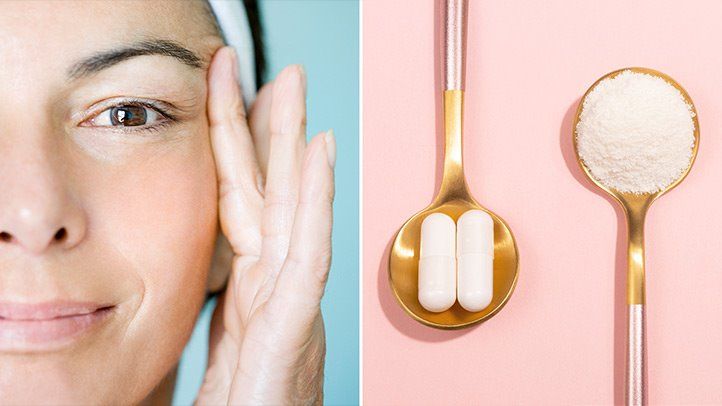There are two main forms of collagen you’re likely to see for sale: oral collagen products like collagen powders, and topical products, like creams and ointments.
Oral Collagen Supplements
Collagen powders have become a popular addition to drinks like coffee, protein shakes, and smoothies. If you don’t like the taste of collagen, or you prefer the convenience of being able to take collagen supplements on the move without the need to mix them into a drink, many manufacturers sell capsules containing collagen powder.
Collagen capsules have the same ingredients and benefits as collagen powder supplements, as the powder contained inside them is the same as you would use to mix with liquids. Some manufacturers also make “collagen shots,” which are premixed collagen drinks for convenience on the go.
Topical Collagen Products
There are two main types of topical collagen product, those which contain collagen, and those which promote collagen growth in the skin using other ingredients.
Collagen-Promoting Topical Products
Topical pro-collagen products include creams, oils, lotions, and serums that you apply to the skin, to stimulate collagen production, including:
One review of studies suggested that Vitamin C analogs in combination with amino acid analogs may create possibilities to effectively enhance the collagen production of skin for antiaging purposes. However, research is mixed, and the review notes that more research is necessary to confirm the effectiveness of these anti-aging treatments.
One case study which used surface and sub-surface skin imaging scans to detect changes to facial skin found that chemical peels can promote collagen remodeling, by triggering the skin’s defense system in response to the temporary inflammatory injury the chemical peel causes.
Collagen-Containing Topical Products
Many topical products containing collagen claim to reduce the visible signs of aging by smoothing wrinkles and maintaining or restoring skin elasticity. Some research supports these claims. In one small study of 22 women, participants observed significant improvements in skin elasticity, density, and wrinkles.
A review of studies concluded that both topical collagen and orally ingested collagen supplements can help in reducing or delaying skin aging, but noted that more studies with large sample sizes are necessary to properly understand the benefits of both forms of collagen.
Read the full article here




